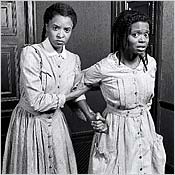
Oprah Winfrey, having dug a million dollars from between her sofa cushions, has gotten into the Broadway producing racket. Crowds approaching the Broadway Theatre’s marquee from the south will read OPRAH WINFREY PRESENTS / THE COLOR PURPLE / A NEW MUSICAL, and from the north will see THE COLOR PURPLE / A NEW MUSICAL / PRESENTED BY OPRAH WINFREY. The reported seven-figure contribution she’s made to the musical, coupled with the bullhorn of her TV show, means no one need fear for this show’s finances.
Yet commercial interests seem to have fallen well down the list of motivations here, at least for the creative team. Celie, the anguished protagonist of Alice Walker’s novel, is a poor black woman from Georgia confronting rape, incest, domestic violence, racism, and a hundred other traumas; there’s a serious edge to this story that would appeal to a talk-show host whose book club put nearly a million copies of Anna Karenina into print last year. Alas, Celie’s story also lends itself to a tone of bland uplift, and a bathetic daytime-TV sensibility clouds almost everything in the show. Even as Celie’s father gives her to the brutish Mister as collateral for a cow, you can imagine how the show’s joyous finale is going to sound.
Now, I’m all for stories with foregone conclusions—does anyone really think Juliet and her beau are headed for a quiet dotage?—provided there’s enough joy in the way they’re told. Jersey Boys, Broadway’s other major new musical of the fall, faced a similar problem of predictability; still, it sparkles with enough wit and invention to engage an audience from start to finish. Even accounting for the graver material in Celie’s story, director Gary Griffin can’t give The Color Purple the same lively pulse.
It’s as if somebody put the pieces of a terrific musical in a box, rattled them around, and let them tumble out at will. You have to enjoy the trio of gossipy ladies who serve as a Greek chorus here, almost as much as you marvel at their spectacular hats. As Celie’s sister, Nettie, Renée Elise Goldsberry radiates the same golden voice and presence that let her run away with Two Gents in Central Park last summer; and as the pugilistic Sofia, the wonderful Felicia P. Fields exhibits an authoritative right cross, serving it up to her husband’s girlfriend and some irritating white folks as occasion demands. Brian MacDevitt illuminates Sofia’s jail cell with the longest, loneliest beam of light this side of the moon.
To the extent these elements hold together amid the show’s lumbering subplots, it’s with an unlikely thread: religiosity. From the outlines of Walker’s story, you can expect the ravaged Celie to toy with a little theodicy. Sure enough, LaChanze—jaw stuck defiantly forward, lock of hair draped over an eye, voice trying to escape the lower register where the songs of Brenda Russell, Allee Willis, and Stephen Bray confine her for most of the night—soon curses the heavens. “God just another man, far as I’m concerned, triflin’, low-down,” she says. By the last curtain, the return of Celie’s belief becomes an occasion for more generally defending the faith. “Look what God has done,” runs the payoff lyric of the finale, after which the creators have the—well, the word would normally be chutzpa—to end their big Broadway musical with the entire cast singing “Amen.”
Amid all this faith-based dramaturgy, it’s no surprise that the lesbian element in Celie’s story gets swept aside. The love she shares with Shug in Walker’s book is dispatched here with a couple of timid kisses and some platitudinous lyrics. Hollywood has gay cowboys, and a Broadway musical gets nervous about an awkward hug? Who’s responsible for this madness?
Horatio Alger, that’s who. The show leaves the impression that Celie’s redemption comes mainly from entrepreneurial zeal. After years of hardship, she discovers worth (of the self- and material kinds) by creating and marketing a product that appeals to almost everybody. That’s the Oprah way—in most of her gigs, at least.
The Color Purple
Lyrics and music by Brenda Russell,
Allee Willis, and Stephen Bray.
Book by Marsha Norman.
The Broadway Theatre.